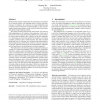Free Online Productivity Tools
i2Speak
i2Symbol
i2OCR
iTex2Img
iWeb2Print
iWeb2Shot
i2Type
iPdf2Split
iPdf2Merge
i2Bopomofo
i2Arabic
i2Style
i2Image
i2PDF
iLatex2Rtf
Sci2ools
PLDI
2010
ACM
2010
ACM
Detecting Inefficiently-Used Containers to Avoid Bloat
Runtime bloat degrades significantly the performance and scalability of software systems. An important source of bloat is the inefficient use of containers. It is expensive to create inefficiently-used containers and to invoke their associated methods, as this may ultimately execute large volumes of code, with call stacks dozens deep, and allocate many temporary objects. This paper presents practical static and dynamic tools that can find inappropriate use of containers in Java programs. At the core of these tools is a base static analysis that identifies, for each container, the objects that are added to this container and the key statements (i.e., heap loads and stores) that achieve the semantics of common container operations such as ADD and GET. The static tool finds problematic uses of containers by considering the nesting relationships among the loops where these semantics-achieving statements are located, while the dynamic tool can instrument these statements and find inefficie...
| Added | 09 Aug 2010 |
| Updated | 09 Aug 2010 |
| Type | Conference |
| Year | 2010 |
| Where | PLDI |
| Authors | Guoqing Xu, Atanas Rountev |
Comments (0)

